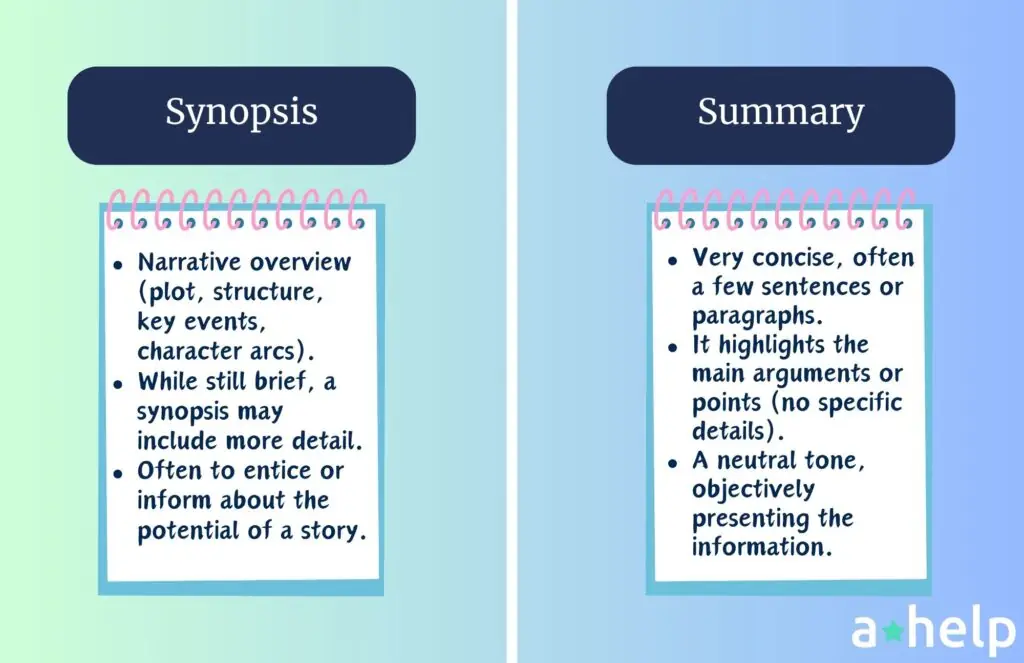When it comes to sharing information in a concise way, two useful tools are the synopsis and the summary. These tools help in shortening longer works, but they do so differently. It’s important to know the difference between them for clear writing and communication. A synopsis is a short overview of a story or plot, mainly used for novels, plays, or movies. A summary, on the other hand, condenses the main points and ideas of a text, like an article or report. Understanding when to use a synopsis or a summary can improve your ability to communicate effectively.

✅ AI Essay Writer ✅ AI Detector ✅ Plagchecker ✅ Paraphraser
✅ Summarizer ✅ Citation Generator
Definition and Purpose: Summary VS Synopsis
A synopsis is a short overview that gives a quick glimpse into the main points or plot of a work. It’s often used in books, movies, or plays to give readers or industry professionals a concise outline without revealing every detail. The main purpose of a synopsis is to provide enough information to spark interest or give a clear idea of the storyline or argument, without going into the depth that the full work would.
|
Short Summary of Shakespeare’s Hamlet
“Hamlet,” a tragedy by William Shakespeare, explores themes of treachery, revenge, incest, and moral corruption. The play follows Prince Hamlet of Denmark, who seeks revenge against his uncle Claudius for murdering his father, taking the throne, and marrying Hamlet’s mother, Gertrude. Hamlet’s quest for vengeance leads to a series of tragic events, including the deaths of Polonius, Ophelia, Gertrude, Claudius, and ultimately, Hamlet himself. The play delves into questions of life, death, and the nature of reality, leaving a lasting impact on literature and drama. |
On the other hand, a summary is a condensed version of a text that brings out its key points and main ideas. Unlike a synopsis, which is more focused on plot or structure, a summary aims to give readers a fast understanding of what the content is about. It distills the essential information, leaving out the finer details and examples. The purpose of a summary is to allow someone to grasp the main arguments or themes of a text quickly, making it easier to decide whether to delve deeper into the full work.
|
Short Synopsis of Shakespeare’s Hamlet
In “Hamlet,” Prince Hamlet of Denmark is devastated by his father’s death and his mother Gertrude’s hasty remarriage to Claudius, his uncle. When the ghost of Hamlet’s father reveals that Claudius murdered him, Hamlet vows revenge. He feigns madness, contemplates life and death, and stages a play to confirm Claudius’s guilt. Claudius plots to kill Hamlet, leading to a series of tragic events. Polonius is accidentally killed by Hamlet, driving his daughter Ophelia to madness and death. In a climactic duel, Laertes wounds Hamlet with a poisoned blade, but Hamlet manages to kill Claudius before succumbing to his own wounds. Gertrude also dies after drinking poisoned wine meant for Hamlet. The play ends with the Norwegian Prince Fortinbras taking control of Denmark. |
Key Differences
When comparing synopses and summaries, it’s important to recognize their distinct features, as they serve different purposes in communication and writing. There are three main differences to consider.
A key difference lies in their length and level of detail. A summary is typically shorter and less detailed than a synopsis. It provides a brief overview, focusing on the main points or ideas of the text. In contrast, a synopsis offers a more detailed outline, especially in the context of a story or narrative. It includes key events, character arcs, and plot points, giving a fuller picture of the work’s structure.
The focus of each also differs. A synopsis usually concentrates on the plot or structure of a story, outlining the sequence of events and the development of characters. This makes it particularly useful for narratives, where understanding the storyline is crucial. On the other hand, a summary is more concerned with the main ideas and arguments of a text. It aims to condense the essential content, stripping away narrative details to highlight the core message or thesis.
The contexts in which synopses and summaries are used also vary. Synopses are commonly found in literature and the film industry, where they provide potential readers or collaborators with a snapshot of a story’s plot. They are often required by publishers, agents, or producers when evaluating a manuscript or script. Summaries, however, have a broader application across fields such as academic writing and business. They are valuable for distilling articles, reports, or research papers, allowing readers to quickly grasp the key points or findings.

By choosing the appropriate tool based on the intended purpose and audience, writers can ensure that their message is conveyed clearly and effectively.
Writing Tips for Students
When writing a synopsis, it’s important to provide a clear and concise outline of the plot and character arcs. Start by summarizing the main events in the story, focusing on the key turning points that drive the narrative forward. Introduce the main characters and describe their development throughout the story, highlighting any significant changes or challenges they face. Keep the language simple and direct, avoiding any unnecessary details that don’t contribute to the overall understanding of the plot.
For summaries, the goal is to distill the content down to its essential points. Begin by reading the text thoroughly to identify the main ideas and arguments. Then, organize these points in a logical order, creating a coherent overview of the material. It’s crucial to avoid adding personal interpretation or opinion; instead, stick to the facts and present the information objectively. Summaries should be brief, so focus on including only the most important information that provides a clear understanding of the text’s content.
So, What’s Main Difference Between a Synopsis and a Summary?
In conclusion, while both synopses and summaries are used to shorten information, they have distinct purposes. A synopsis provides a quick outline of a story’s plot, useful in the literary or entertainment fields. A summary, however, focuses on distilling the key ideas and arguments of a text, often used in academic or professional settings. Knowing the differences between these two tools is crucial for effective writing and communication. By selecting the right one based on your goal and audience, you can ensure your message is clear and concise.
FAQ
Follow us on Reddit for more insights and updates.





Comments (0)
Welcome to A*Help comments!
We’re all about debate and discussion at A*Help.
We value the diverse opinions of users, so you may find points of view that you don’t agree with. And that’s cool. However, there are certain things we’re not OK with: attempts to manipulate our data in any way, for example, or the posting of discriminative, offensive, hateful, or disparaging material.